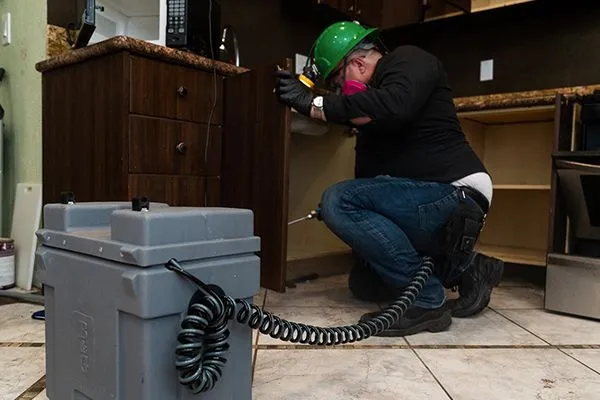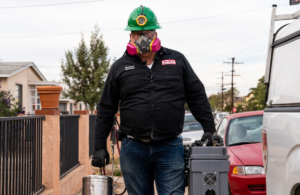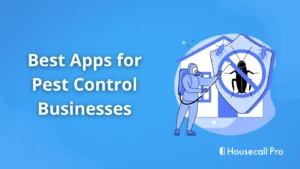Want to win more jobs with less effort?
Grow your business and send quick quotes with our home service software.

Want to see your potential revenue?
See what businesses like yours earn with Housecall Pro in 1 - 2 minutes.

Pest control is a reliable, in-demand field. Technicians and exterminators make an average of $44,730 per year, or $21.51 per hour.* However, your pay can vary depending on where you live, how much experience you have, your professional certifications, and whether you do specialty work.
If you’re considering a career in the pest control industry and want to know how much you can make, this guide covers average pay by state, what drives salaries up or down, the top-paying roles in the industry, and practical steps for growing your career.
Note: The terms “pest control technician” and “exterminator” are used interchangeably, though some people see “exterminator” as a more traditional term and “technician” as the modern version that reflects today’s broader pest management practices.
*All data compiled from the U.S. Bureau of Labor Statistics.
Key highlights:
- The average pest control salary ranges from $32,460 for entry-level roles to over $61,410 for seasoned pros.
- Top-paying states include North Dakota, New Hampshire, and New York.
- Experience level and location have the biggest impact on pay.
- Certifications and commercial accounts can increase earnings.
How much pest control technicians and exterminators make by state: Hourly and annual wages
Where you live is a major factor in how much you make as a pest control specialist or exterminator. Northeastern states and those with higher living costs typically pay more, while southern and rural states typically pay closer to the national average.
Here’s a detailed breakdown of the median pest control tech salaries by state:
| State | Hourly | Annual |
|---|---|---|
| Alabama | $19.24 | $40,020 |
| Alaska | $23.05 | $47,930 |
| Arizona | $18.73 | $38,960 |
| Arkansas | $17.19 | $37,240 |
| California | $21.81 | $45,370 |
| Colorado | $19.12 | $39,770 |
| Connecticut | $22.52 | $46,830 |
| Delaware | $21.29 | $44,283 |
| Florida | $22.02 | $45,790 |
| Georgia | $20.97 | $43,610 |
| Hawaii | $23.28 | $48,420 |
| Idaho | $20.51 | $42,650 |
| Illinois | $22.27 | $46,310 |
| Indiana | $22.66 | $47,130 |
| Iowa | $17.55 | $36,510 |
| Kansas | $21.81 | $45,370 |
| Kentucky | $18.39 | $38,250 |
| Louisiana | $20.00 | $41,600 |
| Maine | $24.01 | $49,940 |
| Maryland | $21.06 | $43,790 |
| Massachusetts | $22.02 | $45,790 |
| Michigan | $21.79 | $45,320 |
| Minnesota | $22.03 | $45,830 |
| Mississippi | $18.09 | $37,620 |
| Missouri | $18.54 | $38,570 |
| Montana | $21.55 | $44,820 |
| Nebraska | $17.83 | $37,090 |
| Nevada | $21.31 | $44,320 |
| New Hampshire | $23.44 | $48,750 |
| New Jersey | $22.29 | $46,370 |
| New Mexico | $17.47 | $36,340 |
| New York | $23.31 | $48,470 |
| North Carolina | $18.05 | $37,530 |
| North Dakota | $23.48 | $48,840 |
| Ohio | $20.88 | $43,420 |
| Oklahoma | $17.73 | $36,880 |
| Oregon | $20.64 | $42,930 |
| Pennsylvania | $21.78 | $45,310 |
| Rhode Island | $22.43 | $46,660 |
| South Carolina | $18.25 | $37,960 |
| South Dakota | $18.68 | $38,850 |
| Tennessee | $21.09 | $43,870 |
| Texas | $20.90 | $43,470 |
| Utah | $20.41 | $42,460 |
| Vermont | $22.25 | $46,280 |
| Virginia | $21.24 | $44,180 |
| Washington | $24.13 | $50,190 |
| West Virginia | $18.24 | $37,930 |
| Wisconsin | $23.26 | $48,370 |
| Wyoming | $17.80 | $37,030 |
What states pay pest control techs the most?
The best-paying states for pest control have higher costs of living and strong commercial demand. For example, New York has some of the highest cost-of-living areas in the country, and pest control salaries reflect that.
Here’s a closer look at the five highest-paying states for pest control professionals and exterminators:
| State | Low | Median | High |
|---|---|---|---|
| Washington | $38,490 | $50,190 | $62,020 |
| Maine | $40,090 | $49,940 | $62,950 |
| North Dakota | $36,380 | $48,840 | $80,580 |
| New Hampshire | $40,020 | $48,750 | $66,250 |
| New York | $39,180 | $48,470 | $75,640 |
What states pay pest control techs the least?
The lowest-paying states for pest control are mostly in the Midwest (Iowa, Nebraska, Oklahoma), reflecting the overall low costs of living. New Mexico and Wyoming are both sparsely populated and have fewer common pests due to their dry climates, leading to lower average salaries for technicians and exterminators.
| State | Low | Median | High |
|---|---|---|---|
| New Mexico | $28,820 | $36,340 | $45,640 |
| Iowa | $30,700 | $36,510 | $50,030 |
| Oklahoma | $28,210 | $36,880 | $50,570 |
| Wyoming | $25,300 | $37,030 | $60,970 |
| Nebraska | $31,090 | $37,090 | $53,060 |
Pest control technician and exterminator salary by experience level
As with many trades, your earning potential increases as you gain more experience and certifications. Entry-level pest control techs and exterminators average about $36,000 annually, but after a few years, it’s common to earn $40,000–$50,000. Senior techs and commercial specialists can earn $60,000 or more, while sales-focused roles like account executives and managers regularly break six figures.
| Experience Level | Annual Salary | Hourly Rate |
|---|---|---|
| Entry (0–2 years) | $36,000 | $18 |
| Intermediate (2–4 years) | $40,000–$50,000 | $20–$25 |
| Senior (4+ years) | $60,000+ | $30+ |
| Pest control sales | $60,000–$75,000 | $20+ plus commission |
Highest-paying pest control jobs

Some roles offer higher pay due to specialization or leadership responsibilities:
- Account executive ($76,000–$121,000): A pest control account executive is on the sales side of the business, helping new and existing customers diagnose the kind of pests on the property and sell additional services and products.
- Branch manager ($63,592–$103,380): Many pest control companies are franchises managed by a branch manager who supervises the techs. These roles involve handling sales for new customers and may perform services themselves as needed.
- Senior commercial pest control technician ($60,000–$80,000): A senior pest control specialist has the training to diagnose complex infestations and create plans to address the worst pest infestations, including termites.
- Termite inspector ($63,000–$105,000): Termite inspectors specialize in diagnosing termite presence, including hard-to-see signs that homeowners may overlook. Their job includes developing plans to address an infestation while preserving as much of the home’s structure as possible.
- Commercial day route tech ($52,000–$65,000): Day routes for commercial clients are the most coveted routes for senior pest control techs. These jobs involve niche work, such as bedbug inspections for hotels or pest prevention in food production facilities.
What influences pest control and exterminator pay?
The pest control industry has plenty of potential to rise through the ranks and make a lot more money. Beyond just years on the job, several factors influence what you take home:
- Certifications: State licenses and specialized certifications can raise your earnings.
- Role: Supervisors and sales staff earn more than general techs and exterminators.
- Market demand: Dense urban and high-infestation areas can offer more commercial accounts with bigger service contracts.
- Unionization: In rare markets with organized labor, wage floors and benefits tend to be higher.
- Seasonality: The work often peaks in spring and summer, and slows in winter (unless you have diversified or commercial routes).
How to increase your pest control salary
According to the BLS, pest control jobs are expected to grow about 5% over the next decade. Luckily, you don’t have to wait a decade to start making serious money. Here are a few steps you can take to increase your earnings.
- Get advanced or specialty certifications, like becoming EPA certified or a Certified IPM Technician.
- Pursue supervisory, sales, or training roles for a steady bump in pay.
- Seek out large commercial accounts—more complexity means higher pay.
- Move to higher-demand or higher cost-of-living states (but check the overall job market first).
- Consider starting your own business, where you set rates, choose accounts, and keep more profits.
Starting your own pest control business
Launching your own pest control business is a great way to unlock higher earning potential. You could purchase a franchise license from a national corporation like Orkin or TruGreen, which comes with the benefits of national advertising and a familiar name. Or you could start your own company. Many consumers prefer small, family-owned businesses, and you may find it easier to get loans from the Small Business Administration (SBA).
Whichever route you take, how you run your business is just as important as your skills and experience. With Housecall Pro’s pest control software, you can spend more time in the field and less time chasing invoices and worrying about product levels.
Housecall Pro’s software is compatible with both independent owner-operator pest control businesses and franchises. It can help you:
- Schedule and dispatch jobs from your phone or laptop
- Immediately communicate schedule changes and additions to your route drivers
- Create custom quotes in minutes using a branded template
- Easily convert quotes to invoices for consistency
- Track performance metrics to manage profitability
- Order more easily
- Balance your books (Housecall Pro integrates with popular accounting software)
- Better manage customer relationships for repeat business, referrals, and positive online reviews
Want to try the features yourself? Sign up for our free 14-day trial.
Pest Control Salary FAQ
-
How long is pest control training?
-
Pest control training usually takes three to six months, depending on your state’s requirements and whether you’re completing classroom instruction, hands-on training, or both. Some states also require passing a licensing exam before you can start working independently.
-
What is the difference in pay between a pest control technician and an exterminator?
-
In most cases, the terms “technician” and “exterminator” are used interchangeably, so pay differences are minimal. However, technicians with specialized training (such as termite control or fumigation) may earn slightly more than general exterminators thanks to the added skillset.
-
Do commercial pest control specialists earn more than residential technicians?
-
Yes, commercial pest control work is larger and more complex, and brings in higher earnings than residential-only routes.
-
Can pest control workers earn commission or performance bonuses?
-
Many pest control companies offer commission or bonuses for upselling services, bringing in new clients, or maintaining high customer satisfaction. This can significantly increase overall compensation, especially for technicians who excel in sales and customer service.
-
How does union membership affect pay in the pest control industry?
-
Unionized pest control workers may receive higher base wages, better overtime rates, and stronger benefits packages than non-union employees. They also tend to have more job security and structured pay increases through collective bargaining agreements.
-
How do seasonal fluctuations affect pest control earnings?
-
Pest control demand typically rises in spring and summer, which can mean more hours and overtime pay. During winter, work may slow down in colder regions, leading to reduced hours. Some companies balance this with year-round contracts or diversified services.






